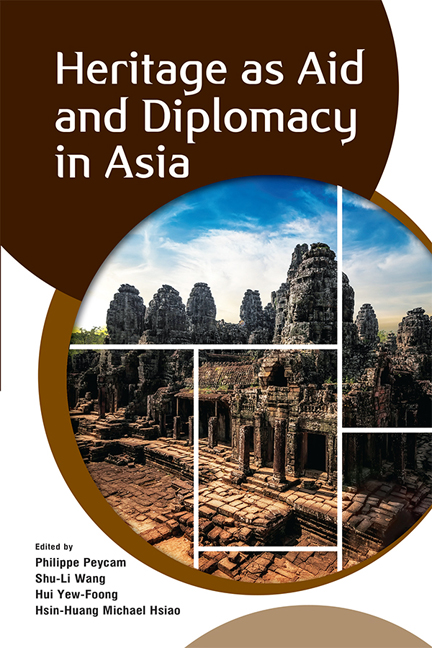Book contents
- Frontmatter
- Contents
- Contributors
- 1 Heritage as Aid and Diplomacy in Asia: An Introduction
- 2 World Heritage and WikiLeaks: Territory, Trade and Temples on the Thai-Cambodian Border
- 3 Heritage Making – Aid For Whom? The Genealogy of Expert Reports in the Hands of Politics and Their Impact in the Case of Preah Vihear
- 4 The International Coordinating Committee for Angkor: A World Heritage Site as an Arena of Competition, Connivance and State(s) Legitimation
- 5 Legacies of Cultural Philanthropy in Asia
- 6 To Help or Make Chaos? An Ethnography of Dutch Expertise in Postcolonial Indonesia
- 7 Heritage Conservation as a Tool for Cultural Diplomacy: Implications for the Sino-Japanese Relationship
- 8 From Ideological Alliance to Identity Clash: The Historical Origin of the Sino-Korean Goguryeo Controversies
- 9 Nationalism, Politics and the Practice of Archaeology in Afghanistan: A Case Study of Bamiyan
- 10 Disappearing Voices: The Politics and Practice of Safeguarding Kunqu Opera in the People’s Republic of China
- 11 Neoliberalizing Heritage: International Agencies and the Local Dynamics of Heritage Conservation in Bali, Indonesia
- 12 Heritage Conservation as Trickle-Down Development
- Index
4 - The International Coordinating Committee for Angkor: A World Heritage Site as an Arena of Competition, Connivance and State(s) Legitimation
Published online by Cambridge University Press: 10 November 2020
- Frontmatter
- Contents
- Contributors
- 1 Heritage as Aid and Diplomacy in Asia: An Introduction
- 2 World Heritage and WikiLeaks: Territory, Trade and Temples on the Thai-Cambodian Border
- 3 Heritage Making – Aid For Whom? The Genealogy of Expert Reports in the Hands of Politics and Their Impact in the Case of Preah Vihear
- 4 The International Coordinating Committee for Angkor: A World Heritage Site as an Arena of Competition, Connivance and State(s) Legitimation
- 5 Legacies of Cultural Philanthropy in Asia
- 6 To Help or Make Chaos? An Ethnography of Dutch Expertise in Postcolonial Indonesia
- 7 Heritage Conservation as a Tool for Cultural Diplomacy: Implications for the Sino-Japanese Relationship
- 8 From Ideological Alliance to Identity Clash: The Historical Origin of the Sino-Korean Goguryeo Controversies
- 9 Nationalism, Politics and the Practice of Archaeology in Afghanistan: A Case Study of Bamiyan
- 10 Disappearing Voices: The Politics and Practice of Safeguarding Kunqu Opera in the People’s Republic of China
- 11 Neoliberalizing Heritage: International Agencies and the Local Dynamics of Heritage Conservation in Bali, Indonesia
- 12 Heritage Conservation as Trickle-Down Development
- Index
Summary
Angkor, a jewel of the Cambodian heritage, has become a shared concern. The interest of the international community has been a turning point in the history of Cambodia. (UNESCO 1993, p. 34)
One year before these self-congratulatory lines were written, the United Nations Educational Scientific and Cultural Organization (UNESCO) listed the archaeological and monumental complex of Angkor in Cambodia as a World Heritage Site. The listing process had closely paralleled the negotiations that led to the Paris Agreements in 1991 and thus to the unprecedented post-conflict mission in the country led by the United Nations. The United Nation's Transitional Authority in Cambodia (UNTAC) sought to restore the political integrity of the country following decades of war and isolation. In this context, UNESCO's recognition of Angkor and its significance symbolized the return of Cambodia to the international stage, while the plan for the management of the site was part of the process of political and economic reconstruction of the country. A number of institutional “stakeholders” were involved in the listing. They were for the most part members of the “international community”, which in the UN diplomatico-bureaucratic jargon signifies primarily representatives of member states. Also, and in UNESCO's language, the listing of Angkor corresponded to the recognition that the site was of “outstanding” and “universal” value (UNESCO 1992, pp. 5–6).
Following the recognition of Angkor as a UNESCO World Heritage Site, an international “campaign” to conserve it was launched at a conference held in Tokyo in 1993. Twenty-nine countries and eight organizations attended this event. Some of them committed to the conservation of a number of temples endangered by material degradation. At this conference, moreover, the participants agreed to establish an International Coordination Committee for the Safeguarding and Development of the Historic Site of Angkor (ICC-Angkor), whose mission was threefold. It would guarantee the “consistency of the projects” implemented in Angkor, define the “technical and financial standards” with which projects must comply, and “call the attention of interested parties” to specific aspects of the site's management (UNESCO 1993, pp. 7–8).
- Type
- Chapter
- Information
- Heritage as Aid and Diplomacy in Asia , pp. 78 - 116Publisher: ISEAS–Yusof Ishak InstitutePrint publication year: 2020



